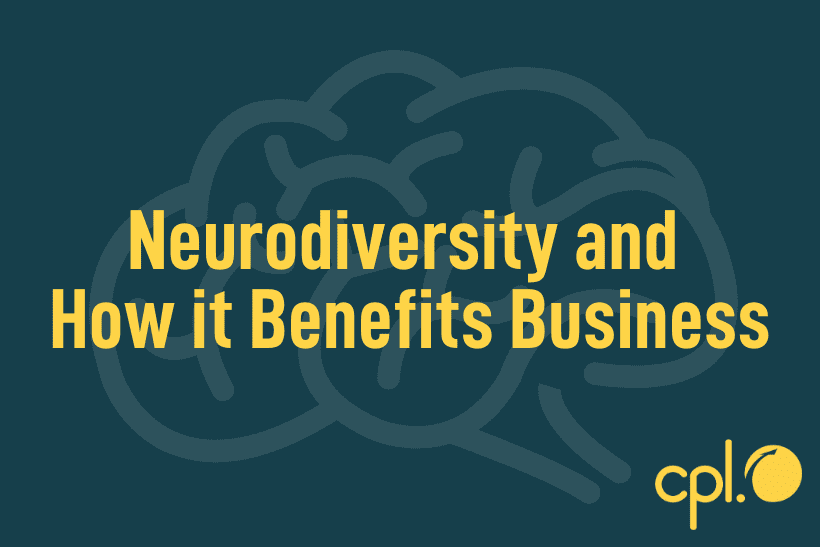Many organisations understand that diversity is crucial for organisation success and as a result Diversity and Inclusion continues to remain in focus.
Companies are embracing diversity of identities, such as gender, race, and cultural background however it's hugely important to also understand how to value and support neurodiversity within your companies.
Neurodiversity refers to the different ways people's brain work and interpret information. Neurotypical refers to people whose brain, processes information is in line with societal norms.
It is estimated that around 1 in 10 people in Ireland areneurodivergent. This means that the brain functions, learns and processes information differently. Neurodivergence includes Attention Deficit Disorders, Autism, Dyslexia and Dyspraxia.
Benefits of Neurodiversity in the Workplace
People that are neurodivergent have talents, perspectives and skills that can be beneficial in many work environments.
Hiring neurodiverse employees can provide companies with a competitive edge that brings measurable benefits, both financially and in terms of workplace culture. Some of these benefits include:
Neurodiverse employees bring unique experiences and skillsets to your office, helping your build effectiveness and diversify your outlook on your engaging audience.
Diversity of all kinds contributes to creativity, innovation, and competitiveness the greater the diversity of your staff, the more unique ideas and perspectives you'll be able to bring to any given problem, and that include neurodiversity
Neurodiverse individuals are an untapped pool of talent, and with 80% of Autistic people in Ireland being unemployed, there is a huge resource to help fill the skills shortage gap especially in the IT and Finance sectors
Nerodiverse companies have been proven to outthink and outperforms heterogeneous spaces.
People with dyslexia often have average or above-average intelligence with excellent creative thinking skills. They tend to have strong problem-solving and spatial reasoning capabilities. This allows them to see a variety of solutions to a problem.
People with Autism tend to excel in areas like rule-based thinking. Many organizations are experiencing benefits from including individuals with these strengths in their workforces.
Limit 'Groupthink. By working with a diverse team, employees have more of an opportunity to learn - from a range of workplace skills. In one study someone with high inclusiveness was about four times more likely to increase their personal growth compared to someone with low inclusiveness.
International companies that are leading the way in Neurodiversity
More and more employers are beginning to understand these benefits and develop hiring initiatives that focus on recruiting and adapting the workplace for neurodiverse workers.
While these efforts are more common in larger corporations, they have proven beneficial for businesses of all sizes in a variety of industries. Here are some international companies that are leading the way with neurodiversity:
JPMorgan Chase hired more than 70 employees with autism between 2015 and 2018. As the executive director and head of Autism at Work at Chase told Fortune, people on the spectrum are highly focused and less distracted by social interactions. 'Our autistic employees achieve, on average, 48% to 140% more work than their typical colleagues, depending on the roles,' he said.
Deutsche Bank and UBS also have programs to increase the autistic population of their workforce
EY's 'Neurodiversity Centre of Excellence,' which has been running since 2016, is helping them lead the way in being Neurodiverse
SAP, the Autism at Work program is proud to have a 90% retention rate of hires on the autism spectrum because it creates a system of support around those employees.
Managing neurodiversity staff remotely
Throughout the crisis, it's extremely important to maintain an inclusive work environment that will allow all talent to thrive.
When it comes to managing neurodiversity staff at home there is no one way that fits all. Those with ADHD, dyslexia and autism, for instance, have different sensory needs.
Organisations must train and encourage management teams to work on a 1:1 basis with the individuals on their teams. It's important to find out their preferred communications method and support them with this - particularly if this is audio-only.
Staff engagement is critical during this time, and it's more than ever important to keep company culture alive. Make sure your neurodiverse staff are getting social interaction if they want it during work such as 15-minute coffee catch-ups.
Overall neurodiversity leads to better business results, more productivity and it impacts the bottom line. The more that businesses can do to make the workplace more inclusive to people of all backgrounds then the better it is for business performance,
